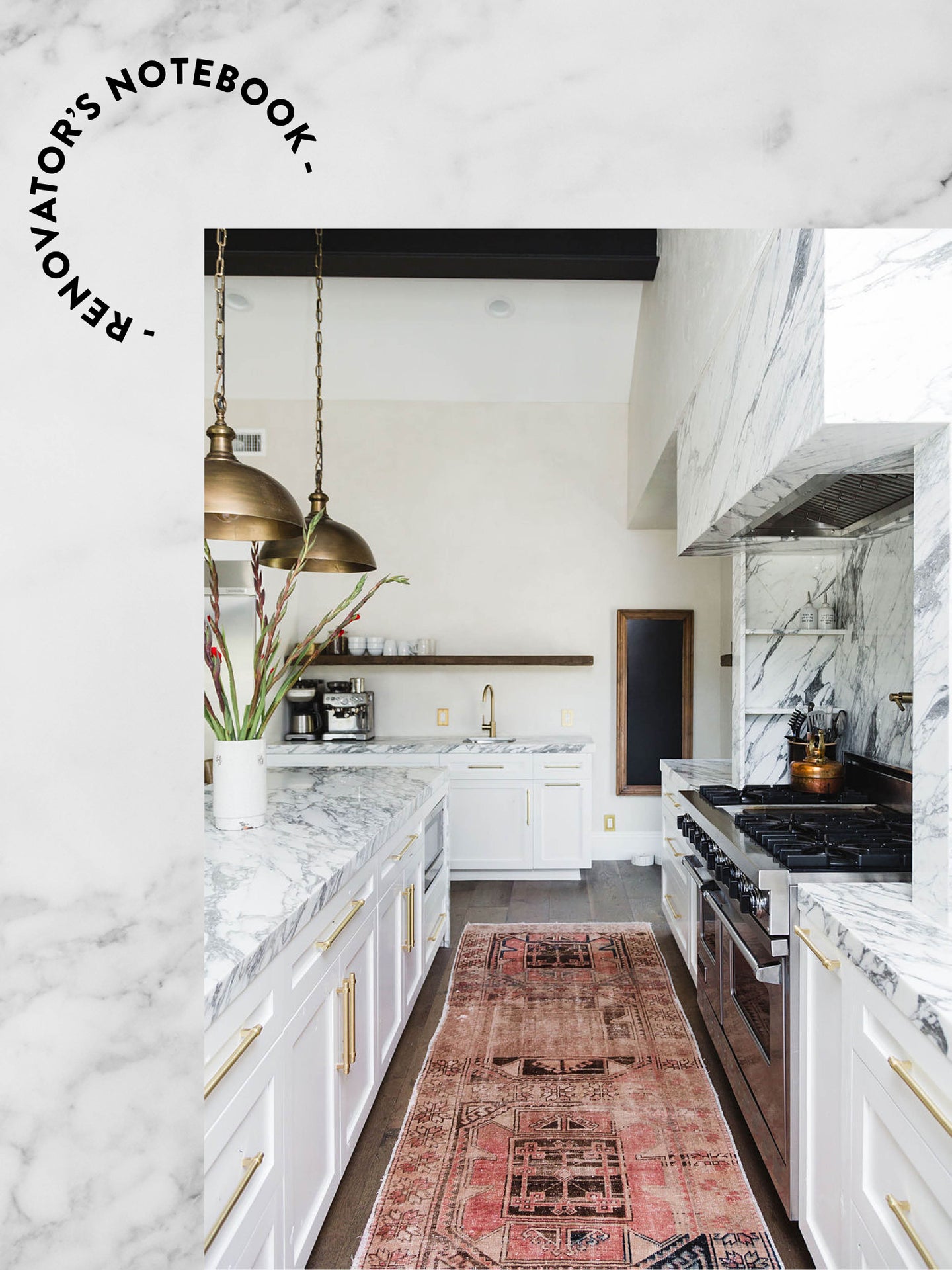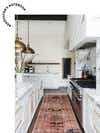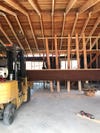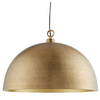With $50K and a Forklift, We Vaulted the Garage and Made a Kitchen
It only takes two people (with practice) to install a beam.
Updated Oct 11, 2018 1:55 PM
We may earn revenue from the products available on this page and participate in affiliate programs.
In Renovator’s Notebook, homeowners open up about the nitty-gritty of their remodels: How long it really took; how much it actually cost; what went horribly wrong; and what went wonderfully, serendipitously, it’s-all-worth-it-in-the-end right. For more tips to nail your next project, follow @reno_notebook.
A garage is the last place you’d expect to find inspiration, but that wasn’t the case when designer and real-estate agent Shirley Slee walked into a Spanish-inspired home in the Olde Carlsbad neighborhood of San Diego. Past the tools, lawn gear, low ceilings, and concrete she saw a marble-clad kitchen with a 10-foot-long island, Venetian plaster walls, and an arched doorway leading to a walk-in pantry. “I immediately started designing the space in my mind,” recalls Slee. “A garage is really just a big blank slate.”
The fact that Slee had never converted a garage into a functioning kitchen before didn’t deter her from going after the permits. After purchasing the house for $785,000, the designer, her husband, and her brother (a general contractor) set out on an all-encompassing remodel. They put in a total of $385,000 ($50,000 of which went toward the kitchen) and ended up selling the place for $1.5 million. As for where the cars go, there’s a whole new, 500-square-foot structure at the end of the driveway with a small apartment up top. Is your garage really just your dream kitchen in disguise? As Slee walks us through her reno, you might be convinced.
Chase Your Permits
My architect and I drew up plans for the space in about two days so we could file for a permit stat. Usually there’s someone called a runner who goes back and forth between the city’s office and the engineer as revisions are made. They only make runs twice a week, so it can really hold up a project. I expedited things by making all those trips myself. We got a stamp of approval within six weeks.
Practice Makes Perfect
After ripping up the old foundation with jackhammers, we poured a new surface, trenched the plumbing, and brought in a 34-foot-long steel I-beam so we could vault the ceiling and expand into the old living room. The tricky part was getting it up there with just two people and a forklift. My husband and brother did a few dry runs with a wood beam, mimicking the movement and figuring out how to balance it, before putting the real thing in place. I was going to wrap it in wood, but we left it black for a modern touch.
Let Your Stone Stand Out
I believe Carrara marble gets better with age and patina. I have a good relationship with my stone yard, so I got a deal on the five slabs (around $400 each), but they’d normally go for around $1,900. I wanted to add something with impact, which is why we did the custom liner around the range. The side niches are super-practical for storing spices and oils, but more important, they look like they were always meant to be there.
Buy Shelving in Bulk
To me, a kitchen is what sells a home, so I wanted this space to have that airy feeling, which is why I decided against upper cabinets. My brother and I bought about 20 foot-long bridge timbers a while back near Mammoth Mountain, where I was born. We’ve used the wood to make open shelves for a number of projects—this space included.
Get Scrappy With High-End Appliances
I always splurge on newer, high-end refrigerators and tack on a 10-year warranty, because I’ve found that older ones just don’t last. As for ranges, I’ll get thrifty. I know someone in Orange County who pulls them out of multimillion-dollar homes and will refurbish them for me—I’ll get a $14,000 Viking range for $4,000. They’re used but they work great and look practically brand-new.
Triple-Check Your Plaster
We had the guy who did the stucco on the exterior apply the Venetian plaster on all the walls and in the pantry in the kitchen. (If I would have hired a professional to do that, it would have cost at least three times the amount.) He hadn’t used using the plaster product before, and because he didn’t apply a bonding agent the first time around, the finish would peel right off if we put blue tape over it. We had to do a totally new coat, but it turned out amazing in the end. Now it’s as smooth as honey.









